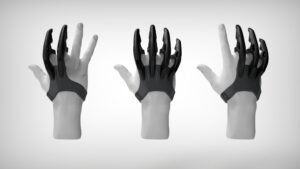
The Lunet prosthetic finger device, developed by David Edquilang, a design student at the University of Houston, was named the Luminary Winner award at this year’s Red Dot Award: Design Concept in Singapore.
The 3D-printed prosthesis uses a low-cost design that features parametric adjustment for different hand types. The fingers work by using a novel, robust linkage mechanism that is controlled by flexing the hand. The entire design features components that snap together and require zero metal fixtures and can be made at less than 1 percent of the price of commercially sold finger prostheses.
“Under the right conditions, Lunet can easily be manufactured even in one’s home using desktop 3D printers and can be assembled without any fasteners or extra components,” Edquilang told Yanko Design. “With the right 3D files, people can print, modify, and upgrade their own prosthetics for daily as well as situational use.”
“Lunet is not just a sci-fi looking concept, it’s real and it works; and will be released online to everyone completely for free as an open-source design. This way, Lunet can do the most good, helping as many people as possible,” Edquilang said. “I believe that good design should not be exclusive only to those that have enough money to afford it. Design is about solving problems, helping the fellow human.”





